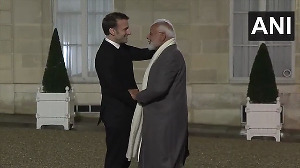There's a time for everything. When a cartoonist is being arrested for his cartoons, for cartoons that caused no harm, incited no violence, killed no people, then do you discuss the cartoons or the cartoonist's incarceration?
No, it's not good enough to say, 'The sedition case is bad but the cartoons, you know ' That won't cut it. Your support for freedom of speech and expression cannot be half-hearted, it can't be dependent upon good taste.
First they came for the cartoonists with bad taste and I didn't speak out because I had good taste .
I am a great fan of Hemant Morparia's cartoons but really Morpariaji, why do you grudge Aseem Trivedi the publicity? He didn't ask for this publicity.
First they came for the cartoonist who wanted to be famous and I didn't speak out because I wasn't publicity-hungry
Oh yes, Aseem Trivedi's eagerness to see Ajmal Kasab hanged bothers me, not least because I oppose capital punishment. Yes, seeing Ajmal Kasab hang to death here and now so that right-wingers can clap and jeer does sound barbaric to me. And no, I won't draw a cartoon that shows Kasab as a dog peeing on the Indian Constitution.
But if views like this landed you in jail then can I please give you names of a thousand and one Hindutva nuts who say this and much worse on Twitter every day?
What did you say? You oppose the sedition charges and the arrest but want to condemn his cartoon as right-wing? You want to call him fascist?
Sure, your right to free speech. But you may be saying one day -- first they came for the fascists and I didn't speak out because I was a liberal.
I stand up for the right to freedom of speech and expression of those I do not agree with even more strongly than I do for those I agree with. I do so to ensure that when my right to freedom of speech and expression is under threat from the other side, I can remind them I had stood up for them. So that I can say: censorship, legal harassment and incarceration is not the answer to political differences.
On Twitter and Facebook, on one news channel after another, it is a bit nauseating to see everyone dissect Aseem Trivedi's cartoons after pretending they're so bad they can't be displayed. This is the level of courage the Indian media has, this is how committed India's free press is to the right to freedom of speech and expression.
Sedition is bad, Arnab Goswami said on your channel, but aren't your cartoons in bad taste? Aseem Trivedi gave it back to Goswami in the same coin: many say your news anchoring is in bad taste, that you shout and scream a bit too much, does it mean you shouldn't be allowed to do it?
But Aseeem! The point here is
Why are we discussing Aseem Trivedi's cartoons if they're so bad, so crude, so unsubtle, so politically incorrect? We're doing so because they are in the news. Why are they in the news? Because he's been arrested. Did they merit incarceration? Clearly not. So who is to blame? The Maharashtra government.
The
So what should you be outraging about? The Maharashtra government's crude decision or Aseem Trivedi's crude cartoons?
If Aseem Trivedi's cartoons are in bad taste, seeking jail for him is far higher on the scale of bad taste. If his Kasab cartoon is an insult to the Constitution, wanting to put him in jail for it under sedition or any other law is a far greater insult to the Constitution. And yet, we want to give out token condemnation of the bad taste in filing cases against a cartoonist for political disagreement and then sit in judgement on the quality and the politics of the cartoons. What's wrong with us?
I don't share the elitism of this good taste business. Good taste is subjective. And I don't mind if Aseem Trivedi sees himself as a revolutionary. His work may be propagandist but he admits as much when he says he is trying to change the world through his cartoons. Why should we say things like, 'He is a propagandist and not a cartoonist'? If propaganda can be carried out through prose and poetry, cinema and journalism, why not cartooning?
What is it about India's senior, well-known cartoonists that make them feel so threatened by a 25-year-old, independent, unemployed cartoonist whose website has been shut down by the government, who is being hounded by several cases in Mumbai and in a district court in Maharashtra, and who has been running from Delhi to Chennai to campaign against draconian internet censorship laws?
Perhaps we should all persuade Kapil Sibalji to enact a new law: The Bad Taste (Prevention) Act. We could have a jury of news anchors and cartoonists vet the cartoons we make before we can post them on our websites.
That is not as unreasonable as you think: after all that is how we deal with cinema. A censor board vets our films and it's so much a part of our film culture it doesn't anger us.
This is the problem with the debate on freedom of speech and expression in India. We don't debate what is "reasonable restriction" and what is censorship. We examine every cartoon, painting, film and book through our ideological prism. The left, right and centre in India are all guilty of this. Unlike the United States, which gives its citizens the right to even burn their flag, we don't debate free speech with the aim of furthering freedom. We debate it such that we tilt more on the side of censorship, wittingly or unwittingly.
The Muslims are outraged by Satanic Verses and the Hindus by MF Husain's paintings and the Dalits by an Ambedkar cartoon and in each case we end up with censorship rather than freedom. We choose whose freedom we want to support. We are selective in our support and in our outrage. Those who defend Taslima Nasreen's right to free speech don't discuss how third-rate her writing is. Because it's immaterial.
If you agree that Aseem Trivedi's cartoons don't merit three years in jail, the conversation is over. If you're going to add ifs and buts, you're adding to the case against him. Seeking jail for a cartoonist who shows Parliament as a toilet to protest against corruption should be unacceptable in a democracy. But if you are going to divert attention from such clamping down of dissent by discussing good taste, then be ready to say goodbye to democracy.







 © 2025
© 2025